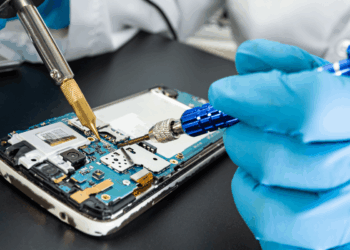Whether they were small repair business owners, industry associations or passionate individuals, hundreds of commenters on a recent right-to-repair petition to the Federal Trade Commission broadly agreed that consumers ought to have more options for fixing their devices and using them longer.
Many argued that the commission therefore should set nationwide rules for electronics manufacturers that have the force of law.
“Technology has become a necessary component of our lives and is required to do everything from applying for social services [to] job seeking, completing homework, accessing healthcare and participating in our tech-driven society,” wrote Free Geek, a repair and refurbishment nonprofit in Oregon, echoing similar comments from The Repair Association, Digital Right to Repair Coalition and scores of others.
“We need the FTC to take action to preserve the right to repair the devices that people own, the right to refurbish devices and get them back into the hands of people who need them and hold manufacturers accountable for the products that they produce negatively impacting our environment,” Free Geek added.
The Consumer Technology Association, whose members include Apple, Google and other major OEMs, was among some organizations that argued it wasn’t the commission’s place to intervene. In a joint statement with the Information Technology Industry Council, TechNet and CTIA, it pointed to data privacy, battery fires and other concerns and said manufacturers are increasing access to tools, parts and other repair resources safely.
“At bottom, the issues raised in the petition are largely their own policy judgments on complex fact-specific issues, including those involving electronic device sustainability practices, areas in which industry has been actively leading and making meaningful progress,” the groups wrote.
The public comments are the latest step in just one of many right-to-repair debates playing out across the country and across a variety of sectors. Recently passed legislation in a handful of states aimed to knock down some of the restrictions that manufacturers previously set around who can repair their devices and how.
“Manufacturers do so in a number of ways, including requiring the use of specialized tools, implementing software locks, and withholding repair information from the public,” U.S. PIRG (Public Interest Research Group) and repair advocacy organization iFixit wrote in their petition to the FTC in November. It called for a national repairability index for products and other changes.
The FTC now reviews the comments and has the option to grant or deny the petition in whole or in part. Any rulemaking that follows will likely bring its own public comment period.
The commission previously announced it would increase enforcement of existing laws prohibiting manufacturers from blocking independent repair, which came shortly after the White House issued an executive order encouraging the FTC to support right-to-repair policies.
The comments in some ways reflected how the discussion has developed over time, becoming less of a dispute over whether the right to repair should exist and more of a dispute over its reach. Apple last year said it would support a national right to repair law in certain forms, and Google backed “sensible” rules in Oregon.
The Arkansas Farm Bureau Federation (AFBF), an agricultural lobbying group, encapsulated the divide. The federation over the past year secured memorandums of understanding with John Deere and other manufacturers that are meant to make it easier for farmers to repair their equipment. It also opposed the FTC petition, saying an industry- and manufacturer-specific approach is best.
“When AFBF’s members charged the organization with outreach to equipment manufacturers on the right to repair, they expressed a preference for private sector, market-based solutions over legislation,” the group wrote to the commission. “AFBF’s members believe it is about sitting down at the table and sorting things out, which is what was done and what will continue to occur under the MOUs.”
On the other hand, Farm Action, another agricultural advocacy group that aims to prevent rural monopolies, said it “wholly supports the petition,” pointing to the vastly increased complexity of combines and other machines. A federal rule could give explicit, consistent boundaries for what is and isn’t allowed and lay out a framework for future industry trends, it said.
“Farmers know best how global equipment manufacturers like John Deere have obstructed their operations, coerced inflated repair costs from them and violated their consumer rights with the denial of basic information,” the group wrote. “Farm Action urges FTC to swiftly – before the end of this administration’s term – issue a strong rule capturing and addressing each of the anticompetitive, unfair and deceptive practices set forth by this comment.”


























